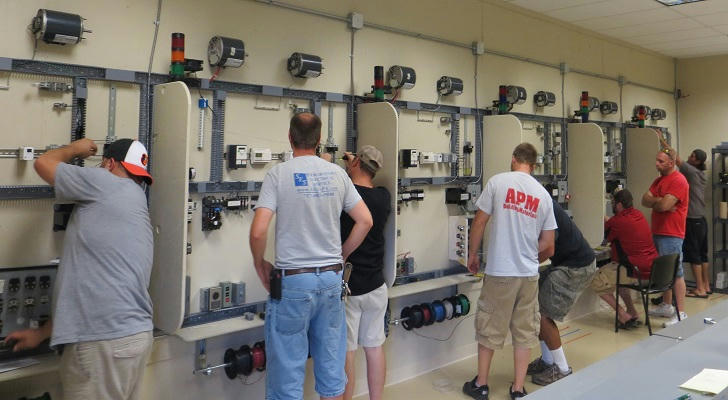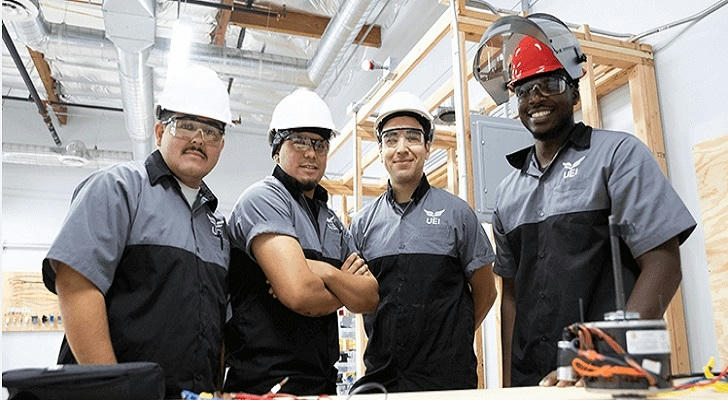Electrician Training Program: A Pathway to a High-Demand Career
Introduction
Electricians are essential professionals who ensure that homes, businesses, and industries function safely with reliable electrical systems. As the demand for skilled tradespeople continues to grow, an electrician training program offers a stable career, competitive salary, and strong job prospects. Many institutions, such as Penn Foster, Ashworth College, and Lincoln Tech, provide flexible training options for aspiring electricians.

Why Choose an Electrician Training Program?
Pursuing a career as an electrician comes with several advantages:
✅ High Demand – The U.S. Bureau of Labor Statistics estimates a 7% job growth for electricians by 2031.
✅ Good Salary – Entry-level electricians earn around $45,000 per year, while experienced professionals make over $80,000 annually.
✅ Short Training Time – Many programs can be completed in 6 months to 1 year, with apprenticeships lasting 2-4 years.
✅ Flexible Learning Options – Schools like Penn Foster offer online courses for working professionals.
✅ Career Advancement – With additional certifications, electricians can become master electricians, contractors, or electrical engineers.
Course Overview
Electrician training programs provide a mix of theory and hands-on practice to prepare students for real-world electrical work. Topics typically covered include:
🔧 Basic Electrical Theory – Voltage, current, resistance, and circuits.
⚡ Electrical Codes & Safety – Training in National Electrical Code (NEC) and OSHA safety regulations.
🏡 Residential & Commercial Wiring – Installing and maintaining wiring in homes and businesses.
🔌 Blueprint Reading & Technical Drawings – Learning to interpret electrical blueprints.
🔋 Renewable Energy & Smart Technology – Solar panels, EV chargers, and energy-efficient systems.

Certification & Licensing
To become a certified electrician in the U.S., candidates must complete education, apprenticeship, and licensing exams. Steps include:
1️⃣ Enroll in a Training Program – Several institutions offer electrician training programs, including Lincoln Tech, Ashworth College, Penn Foster, and UEI College. These programs provide a mix of online and hands-on training, covering electrical theory, safety regulations, and practical wiring techniques. Depending on the institution, students can complete a diploma or certificate program in as little as 6 to 12 months, making it a flexible and efficient path for those looking to enter the workforce quickly.
2️⃣ Gain Apprenticeship Experience – After completing a training program, candidates must work as an apprentice under a licensed electrician, gaining 4,000 to 8,000 hours of real-world experience over 2 to 4 years. Apprenticeships are often arranged through trade unions like the International Brotherhood of Electrical Workers (IBEW) or non-union programs such as the Independent Electrical Contractors (IEC). During this period, apprentices learn advanced wiring techniques, troubleshooting, blueprint reading, and compliance with electrical codes.
3️⃣ Pass the Licensing Exam – Each state has its own licensing requirements, but most include a written and practical exam testing knowledge of the National Electrical Code (NEC), safety standards, and local regulations. Some states also require electricians to complete continuing education courses to stay updated on industry changes. Schools like Altierus Career College offer preparatory courses to help students pass licensing exams more efficiently.
4️⃣ Earn Additional Certifications – To enhance career opportunities, electricians can pursue specialized certifications in areas like industrial electrical systems, renewable energy installation, and smart home technology. Certifications from organizations like the Electrical Training Alliance, the National Fire Protection Association (NFPA), or the North American Board of Certified Energy Practitioners (NABCEP) can improve job prospects and salary potential. Many electricians also pursue master electrician licenses, allowing them to start their own electrical contracting businesses or take on supervisory roles in the industry.

Career Opportunities
Electricians can work in various industries, including construction, manufacturing, utilities, and maintenance. Common career paths include:
Residential Electrician – Works in homes, installing and repairing electrical systems.
Commercial Electrician – Focuses on businesses and large buildings.
Industrial Electrician – Installs and maintains systems in factories.
Maintenance Electrician – Conducts regular electrical maintenance in hospitals, schools, and offices.
Solar Panel Technician – Specializes in renewable energy installations.
Success Stories
🔹 Mike, a Former Retail Worker – Struggling with low wages, Mike completed an 8-month electrician course at Lincoln Tech. After two years as an apprentice, he became a licensed journeyman electrician, earning over $65,000 annually.
🔹 Sarah, a Single Mother – Looking for a stable career, Sarah took Ashworth College’s online electrician program while working part-time. She is now a commercial electrician with flexible hours and job security.
Conclusion
An electrician training program is an excellent choice for those seeking a high-demand, high-paying, and hands-on career. With structured training from institutions like Penn Foster, Ashworth College, and Lincoln Tech, anyone can enter this rewarding and essential industry in as little as 6-12 months.
🔥 Start your training today and power up your future as a certified electrician! 🔥
